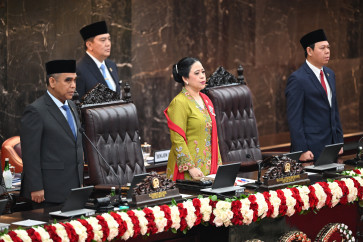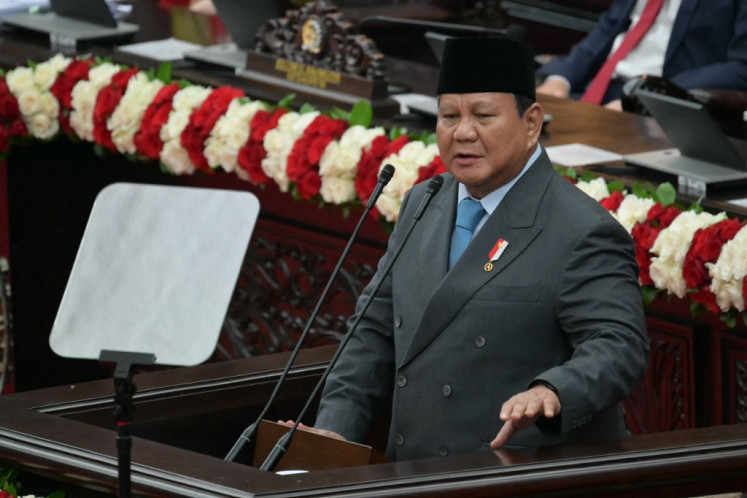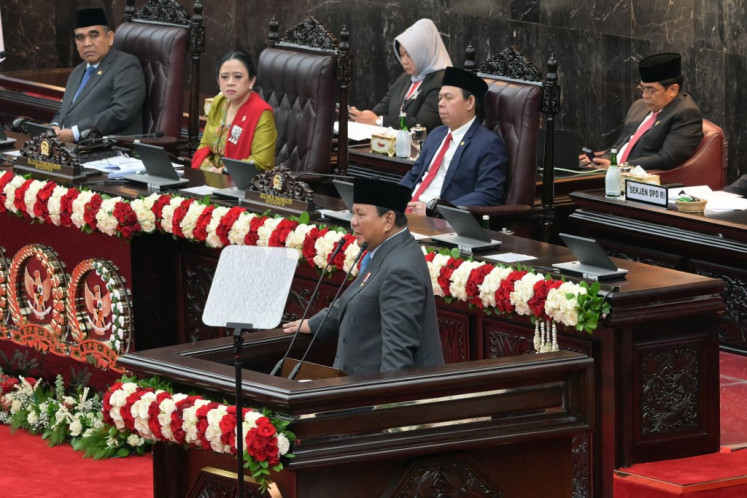Popular Reads
Top Results
Can't find what you're looking for?
View all search resultsPopular Reads
Top Results
Can't find what you're looking for?
View all search resultsPalembang tradition seeks UNESCO recognition
Bounty for the belly: A group of women enjoys a ngobeng (traditional feast) in Palembang, South Sumatra
Change text size
Gift Premium Articles
to Anyone
B
ounty for the belly: A group of women enjoys a ngobeng (traditional feast) in Palembang, South Sumatra. The meal is usually prepared for wedding ceremonies or other large gatherings.(Courtesy of sripoku.com/Zaini)
A number of young men and women dressed in Palembang's traditional Malay clothing lined up behind the main hall door of the Sultan Mahmud Badaruddin II Museum in Palembang, South Sumatra, on Nov. 26.
Each of them brought a dish for a typical Palembang banquet. There was a tray of rice and side dishes, a bronze teapot for washing hands, a cup of tea as well as a piece of cloth for use as a dining mat.
When the event started, the food bearers walked toward the guests, who were sitting with their legs crossed. This tradition of carrying dishes is known as ngobeng.
Next, accompanied by Malayan music, the dishes were served to form several groups. Each group of dishes was meant for eight people. Groups of men were separated from groups of women.
Before dining, guests’ hands were washed by a youngster using the bronze teapot. This is because the dishes were to be consumed without using any cutlery. This banquet, full of togetherness, is called ngidang.
The Palembang Culture Agency's history and tradition head, Ismail Ishak, told The Jakarta Post that the ngobeng-ngidang tradition was held to introduce the interesting dining culture of Palembang to the young generation as it had a deep philosophical meaning.
Ngobeng displays the importance of gotong royong (mutual cooperation) in the community. Dining together in groups of eight also allows people to cherish silaturahmi (a friendly meeting).
In terms of cultural history, he said, ngobeng-ngidang was influenced by the Arab culture brought by the immigrants. Until now, Arab descendants who live near the Musi River in Palembang still maintain this tradition of dining together.
During the Palembang Sultanate era, the tradition was reintroduced in order to maintain its values. At the time, ngobeng-ngideng was reserved for royal dining events.
The arrangement of food must also follow a crossing pattern, that is, side dishes must be put side by side with pulur (vegetable, chili and fruits). Every guest should also maintain their manners while dining.
This Malay tradition of serving food also exists in other regions. For instance, Jambi people call it bahidang. The difference, according to Ismail, has that the dishes in Jambi were not for eight people. And even when dining together, the dishes are served lengthwise.
Ismail said that the Palembang administration, through its culture agency, would soon register ngobeng-ngidang with UNESCO. In 2018, the tradition was proposed as an Intangible Cultural Heritage to prevent it from dying out.
"In December, the provincial administration is set to submit its proposal to the ministry," he added.
A member of the Palembang Customary Council, Ali Hanafiah, said that ngobeng-ngidang was still held across the city during celebrations to honor guests. The dishes consist of Palembang specialties, such as malbi (beef stew), opor ayam (chicken stewed in coconut milk), vegetables, pickles and chili. For dessert, special Palembang cakes are served, such as gunjing and gandus rice flower cakes and green srikaya (coconut custard).
“This tradition is very Islamic, as we have to honor our guests. We even have to serve them when they're washing their hands, unlike [the more modern] style of eating together," he said.










